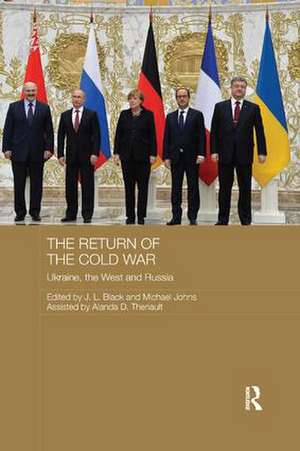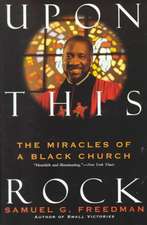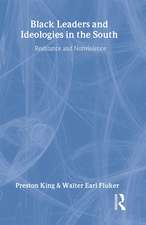The Return of the Cold War: Ukraine, The West and Russia: Routledge Contemporary Russia and Eastern Europe Series
Editat de J. L. Black, Michael Johnsen Limba Engleză Paperback – 12 oct 2017
| Toate formatele și edițiile | Preț | Express |
|---|---|---|
| Paperback (1) | 325.34 lei 6-8 săpt. | |
| Taylor & Francis – 12 oct 2017 | 325.34 lei 6-8 săpt. | |
| Hardback (1) | 933.23 lei 6-8 săpt. | |
| Taylor & Francis – 14 apr 2016 | 933.23 lei 6-8 săpt. |
Din seria Routledge Contemporary Russia and Eastern Europe Series
-
 Preț: 326.15 lei
Preț: 326.15 lei -
 Preț: 325.21 lei
Preț: 325.21 lei -
 Preț: 326.49 lei
Preț: 326.49 lei -
 Preț: 309.79 lei
Preț: 309.79 lei -
 Preț: 321.03 lei
Preț: 321.03 lei -
 Preț: 326.56 lei
Preț: 326.56 lei - 9%
 Preț: 934.69 lei
Preț: 934.69 lei -
 Preț: 302.32 lei
Preț: 302.32 lei -
 Preț: 318.10 lei
Preț: 318.10 lei -
 Preț: 379.30 lei
Preț: 379.30 lei - 25%
 Preț: 824.70 lei
Preț: 824.70 lei - 18%
 Preț: 1058.79 lei
Preț: 1058.79 lei - 18%
 Preț: 1111.51 lei
Preț: 1111.51 lei - 18%
 Preț: 950.71 lei
Preț: 950.71 lei -
 Preț: 464.54 lei
Preț: 464.54 lei - 18%
 Preț: 1168.76 lei
Preț: 1168.76 lei - 16%
 Preț: 130.54 lei
Preț: 130.54 lei - 26%
 Preț: 821.46 lei
Preț: 821.46 lei - 18%
 Preț: 1169.78 lei
Preț: 1169.78 lei -
 Preț: 413.98 lei
Preț: 413.98 lei -
 Preț: 387.49 lei
Preț: 387.49 lei -
 Preț: 396.90 lei
Preț: 396.90 lei - 18%
 Preț: 1064.01 lei
Preț: 1064.01 lei - 18%
 Preț: 1220.77 lei
Preț: 1220.77 lei -
 Preț: 418.13 lei
Preț: 418.13 lei - 18%
 Preț: 1060.87 lei
Preț: 1060.87 lei -
 Preț: 413.37 lei
Preț: 413.37 lei - 18%
 Preț: 707.96 lei
Preț: 707.96 lei - 18%
 Preț: 1058.65 lei
Preț: 1058.65 lei - 18%
 Preț: 948.84 lei
Preț: 948.84 lei - 18%
 Preț: 706.91 lei
Preț: 706.91 lei - 18%
 Preț: 1059.84 lei
Preț: 1059.84 lei -
 Preț: 488.33 lei
Preț: 488.33 lei - 18%
 Preț: 1056.28 lei
Preț: 1056.28 lei -
 Preț: 390.12 lei
Preț: 390.12 lei - 18%
 Preț: 1053.16 lei
Preț: 1053.16 lei - 18%
 Preț: 1056.28 lei
Preț: 1056.28 lei - 28%
 Preț: 850.91 lei
Preț: 850.91 lei - 18%
 Preț: 1171.89 lei
Preț: 1171.89 lei - 18%
 Preț: 1050.78 lei
Preț: 1050.78 lei - 18%
 Preț: 1166.68 lei
Preț: 1166.68 lei - 18%
 Preț: 1058.79 lei
Preț: 1058.79 lei - 18%
 Preț: 1971.48 lei
Preț: 1971.48 lei
Preț: 325.34 lei
Preț vechi: 371.71 lei
-12% Nou
Puncte Express: 488
Preț estimativ în valută:
62.25€ • 65.16$ • 51.81£
62.25€ • 65.16$ • 51.81£
Carte tipărită la comandă
Livrare economică 31 martie-14 aprilie
Preluare comenzi: 021 569.72.76
Specificații
ISBN-13: 9781138572355
ISBN-10: 1138572357
Pagini: 312
Ilustrații: 14 Line drawings, black and white; 6 Halftones, black and white; 6 Tables, black and white; 20 Illustrations, black and white
Dimensiuni: 156 x 234 x 35 mm
Greutate: 0.45 kg
Ediția:1
Editura: Taylor & Francis
Colecția Routledge
Seria Routledge Contemporary Russia and Eastern Europe Series
Locul publicării:Oxford, United Kingdom
ISBN-10: 1138572357
Pagini: 312
Ilustrații: 14 Line drawings, black and white; 6 Halftones, black and white; 6 Tables, black and white; 20 Illustrations, black and white
Dimensiuni: 156 x 234 x 35 mm
Greutate: 0.45 kg
Ediția:1
Editura: Taylor & Francis
Colecția Routledge
Seria Routledge Contemporary Russia and Eastern Europe Series
Locul publicării:Oxford, United Kingdom
Public țintă
Postgraduate and UndergraduateCuprins
International Relations 1. Assisted Suicide: Internal and External Causes of the Ukrainian Crisis 2. Caught Between Russia and NATO: The EU During and After the Ukrainian Crisis 3. Belarus in the ‘New Cold War’: A Promising Mediator? 4. The Crisis in Ukraine and the Ukrainian Diaspora: February-December 2014 Military 5. Brothers Disunited: Russia’s Use of Military Power in Ukraine 6. Explaining the Ukrainian Army’s Defeat in Donbass in 2014 Economic and Social Considerations 7. Western Economic Sanctions and Russia’s East-West Economic Orientation 8. Lost and Forgotten: The Conflict Through the Eyes of the Donbass People Image and Perception 9. Setting the Tone. Misinformation and Disinformation from Kyiv, Moscow, Washington, and Brussels in 2014 10. Shaping New Narratives: How New Histories are Created 11. German Attitudes towards Russia: The Post-Maidan Era in Context 12. The Maidan Massacre in Ukraine: A Summary of Analysis, Evidence, and Findings 13. Conclusion
Notă biografică
J L Black is Professor Emeritus and Distinguished Research Professor of Carleton University, Ottawa, and Director of the Centre for Research on Canadian-Russian Relations with the History Department, Laurentian University, Sudbury, Ontario, Canada
Michael Johns is an Associate Professor of Political Science and Vice Dean of Arts at Laurentian University, Barrie Campus, Barrie, Ontario, Canada
Michael Johns is an Associate Professor of Political Science and Vice Dean of Arts at Laurentian University, Barrie Campus, Barrie, Ontario, Canada
Descriere
This book examines the crisis in Ukraine and discusses how the two sides have engaged in political posturing, accusations, escalating sanctions and further escalating threats, arguing that the ease with which both sides have reverted to a Cold War mentality demonstrates that the Cold War belief systems never really disappeared. The book assesses why Cold War belief systems have re-emerged so easily, and concludes by considering the likely long-term ramifications of the crisis, arguing that the deep-rooted lack of trust makes the possibility of compromise even harder than in the original Cold War.














